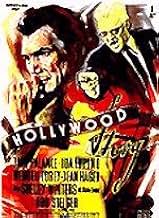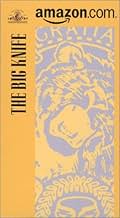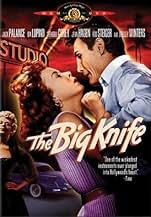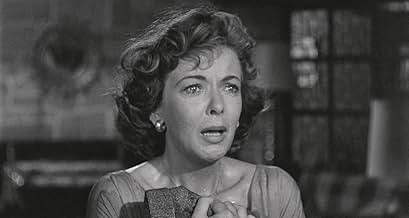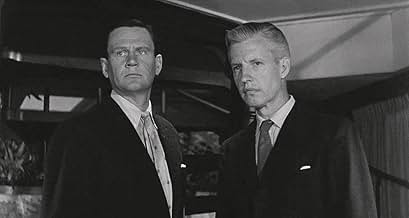AVALIAÇÃO DA IMDb
6,8/10
4,6 mil
SUA AVALIAÇÃO
Adicionar um enredo no seu idiomaHollywood actor Charles Castle is pressured by his studio boss into a criminal cover-up to protect his valuable career.Hollywood actor Charles Castle is pressured by his studio boss into a criminal cover-up to protect his valuable career.Hollywood actor Charles Castle is pressured by his studio boss into a criminal cover-up to protect his valuable career.
- Prêmios
- 1 vitória e 2 indicações no total
Michael Winkelman
- Billy Castle
- (as Mike Winkelman)
Shelley Winters
- Dixie Evans
- (as Miss Shelley Winters)
Richard Boone
- Narrator
- (narração)
- (não creditado)
Nick Cravat
- Nick
- (não creditado)
Robert Emhardt
- Bit Part
- (não creditado)
Michael Fox
- Prize Fight Announcer
- (não creditado)
Paula Kyle
- Party Guest
- (não creditado)
- Direção
- Roteiristas
- Elenco e equipe completos
- Produção, bilheteria e muito mais no IMDbPro
Avaliações em destaque
"The Big Knife" is really a stage play recorded on film. It's a Hollywood soap opera that features a lot of good actors eating the scenery. Rod Steiger and Everett Sloan are great as the monstrous studio honcho and weaselly agent, respectively. Jack Palance is a competent actor but was woefully miscast as the sensitive, tortured matinée idol -- nobody would ever confuse Palance with a matinée idol. Nevertheless, he does an adequate job.
The power of the studio system in the '50s is well depicted, if a bit overwrought. Steiger's performance is particularly delicious as his toweringly self-centered character cries, wheedles, and intimidates his underlings into doing what he wants.
The movie is showing its age but its excesses, especially its colorful language, are a lot of fun. Recommended, 7 out of 10.
The power of the studio system in the '50s is well depicted, if a bit overwrought. Steiger's performance is particularly delicious as his toweringly self-centered character cries, wheedles, and intimidates his underlings into doing what he wants.
The movie is showing its age but its excesses, especially its colorful language, are a lot of fun. Recommended, 7 out of 10.
One of the 10 best of '55 with sparks flying between Palance & Steiger. Subtle performance by Ms. Ida Lupino and intensity personified by J. Palance. Rod Steiger with white hair and hearing aid is pretty scary. Written by Clifford Odets, this realistic Hollywood tale cuts no corners and does not see out.
An 8 out of 10. Best performance = Rod Steiger. Too grim for some. Beautiful B/W cinematography and terrific script and the entire cast is deliberate and impassioned. I don't believe it was nominated for anything, but should have been. I'm not sure if this is on video or DVD, but check it out!
An 8 out of 10. Best performance = Rod Steiger. Too grim for some. Beautiful B/W cinematography and terrific script and the entire cast is deliberate and impassioned. I don't believe it was nominated for anything, but should have been. I'm not sure if this is on video or DVD, but check it out!
The Big Knife is not for everybody. Some will find it very literate, well-directed and acted(mostly), handling the tense and satire aspects deftly, while others will find it overdone. Both viewpoints are completely understandable, for me there were parts where the film did fall into the latter camp but most of the time it was the former.
As an adaptation of the stage play, which is very compelling and thought-provoking, it is very faithful and translates well adaptation-wise. As a film, it's far from perfect but it comes over well as a film.
There are a few things that don't come off quite as successfully as the rest of the film. Rod Steiger has a very ruthless character, but for my tastes Steiger plays the role too broadly to the point that Hoff felt more of a cartoonish caricature than a real person, to the extent that it came close to hurting the balance of the film and he didn't come over as very threatening. In his performance, there is a lot of camp and scenery-chewing, but not enough of the menace that the role so ruthlessly written needs. The ending does dissolve into contrived melodrama, which is where it is most understandable as to why some will find the film overdone, and felt rushed as well. Lastly, the film does feel over-scored in places, in the places where there is music the blaring music cues felt intrusive.
With the exception of Steiger, the performances are very good. Jack Palance's powerhouse lead performance is one of his best, while Ida Lupino is heart-wrenching and dignified. Wendall Corey wisely underplays and is very entertaining, and Everett Sloane, Jean Hagen(chilling in a role so different to hers in Singin' In the Rain) and a memorable Shelley Winters(in a performance that hits hard) do equally pleasingly. The script is remarkably literate and intelligent, with the tension being portrayed quite realistically and the satire being boldly lacerating. The story moves deliberately, but the tension present is enough to haunt the mind and the subject matter is a bold one and told in a biting, sometimes fun and poignant way. The Big Knife is photographed with class and atmosphere, the production values are appropriately claustrophobic and Robert Aldrich's direction is more than able, often excellent.
Overall, a very acquired taste, but for this viewer while not without flaws it was a well done film. 7/10 Bethany Cox
As an adaptation of the stage play, which is very compelling and thought-provoking, it is very faithful and translates well adaptation-wise. As a film, it's far from perfect but it comes over well as a film.
There are a few things that don't come off quite as successfully as the rest of the film. Rod Steiger has a very ruthless character, but for my tastes Steiger plays the role too broadly to the point that Hoff felt more of a cartoonish caricature than a real person, to the extent that it came close to hurting the balance of the film and he didn't come over as very threatening. In his performance, there is a lot of camp and scenery-chewing, but not enough of the menace that the role so ruthlessly written needs. The ending does dissolve into contrived melodrama, which is where it is most understandable as to why some will find the film overdone, and felt rushed as well. Lastly, the film does feel over-scored in places, in the places where there is music the blaring music cues felt intrusive.
With the exception of Steiger, the performances are very good. Jack Palance's powerhouse lead performance is one of his best, while Ida Lupino is heart-wrenching and dignified. Wendall Corey wisely underplays and is very entertaining, and Everett Sloane, Jean Hagen(chilling in a role so different to hers in Singin' In the Rain) and a memorable Shelley Winters(in a performance that hits hard) do equally pleasingly. The script is remarkably literate and intelligent, with the tension being portrayed quite realistically and the satire being boldly lacerating. The story moves deliberately, but the tension present is enough to haunt the mind and the subject matter is a bold one and told in a biting, sometimes fun and poignant way. The Big Knife is photographed with class and atmosphere, the production values are appropriately claustrophobic and Robert Aldrich's direction is more than able, often excellent.
Overall, a very acquired taste, but for this viewer while not without flaws it was a well done film. 7/10 Bethany Cox
The Big Knife is a mostly good adaptation of a Clifford Odets play about a Hollywood actor who's being blackmailed into studio servitude while trying to patch up his failing marriage. This is a movie for which the word powerful was truly invented. Most of the film takes place on one set and places heavy emphasis on speeches from the individual characters for its really riveting moments (as I would expect from a stage play), but those moments definitely get across. The whole cast is good, but Jack Palance in a nuanced and fiery performance as the actor Charlie Castle, and Rod Steiger, giving a deeply felt and passionate realization of the corrupt studio boss are nothing short of superb. The screenplay is full of smart, incisive, biting dialogue as well. Except for a melodramatic turn at the end, that, for me, takes a lot of the edge off the story, this is a well-acted film that is solid, though not spectacular, entertainment. 3*** out of 4
The Big Knife (1955)
You always expect something edgy and a hair impolite with a Robert Aldrich film, from his over-the-top film noir cult classic "Detour" to the bizarre and gripping "What Ever Happened to Baby Jane?" It's almost as though his rich upbringing and rejection of a nice political life made him a fearless renegade. Give him credit. He cracked the Hollywood doldrums of the 1950s and early 60s like few other directors (Kubrick comes to mind as a big budget parallel).
So you can get a lot out of "The Big Knife" in understanding Aldrich. And you can really enjoy a superb set of performances, mainly by Ida Lupino as the leading man's wife, and by Everett Sloan in an aging version of his usual submissive chumminess. Rod Steiger is there, powerful and a bit overacted, if you can overact in an Aldrich movie, and the headliner, Jack Palance, does his best at being a leading man, and is pretty fine, especially since his role is as a Hollywood actor with flaws.
Throw in some really crisp cinematography by Ernest Lazlo, one of the best of his generation. Sometimes the camera will take on an angle that rocks you slightly, as when it is looking up from the floor at Palance on the massage table, with his agent towering overhead. More subtle is Lazlo's fluid long takes, or even fluid short takes, where the camera just makes sense of a scene not by framing it right (which is expected) but by moving it during the take. Once you notice it, you appreciate more and more how the interior of this house (the set for the whole movie) is made dimensional and alive.
I say all this up front because the movie struggles against the story and writing despite all this. It's a play adapted to the screen, but rather literally, with the one main set for all the shooting. And it talks a lot. I don't see this working even on a stage, where you want and get dialog. Here it's almost deadening. Not that it quite is ever boring, but it tries too hard, and it pulls a couple of sensational twists out as it goes, with another sensational twist at the end. On top of all that is just a level of credibility. None of these Hollywood businessmen strike you as quite right, and what they say or do is all caricature.
Not that we expect a movie, especially an Aldrich movie, to be believable. But there has to be some compensating excitement. This one, with a great noir title but no real noir qualities, never quite flies. It's worth watching if you like Lupino or Aldrich in particular, and it has moments of real intensity, but that might not be enough in the big picture.
You always expect something edgy and a hair impolite with a Robert Aldrich film, from his over-the-top film noir cult classic "Detour" to the bizarre and gripping "What Ever Happened to Baby Jane?" It's almost as though his rich upbringing and rejection of a nice political life made him a fearless renegade. Give him credit. He cracked the Hollywood doldrums of the 1950s and early 60s like few other directors (Kubrick comes to mind as a big budget parallel).
So you can get a lot out of "The Big Knife" in understanding Aldrich. And you can really enjoy a superb set of performances, mainly by Ida Lupino as the leading man's wife, and by Everett Sloan in an aging version of his usual submissive chumminess. Rod Steiger is there, powerful and a bit overacted, if you can overact in an Aldrich movie, and the headliner, Jack Palance, does his best at being a leading man, and is pretty fine, especially since his role is as a Hollywood actor with flaws.
Throw in some really crisp cinematography by Ernest Lazlo, one of the best of his generation. Sometimes the camera will take on an angle that rocks you slightly, as when it is looking up from the floor at Palance on the massage table, with his agent towering overhead. More subtle is Lazlo's fluid long takes, or even fluid short takes, where the camera just makes sense of a scene not by framing it right (which is expected) but by moving it during the take. Once you notice it, you appreciate more and more how the interior of this house (the set for the whole movie) is made dimensional and alive.
I say all this up front because the movie struggles against the story and writing despite all this. It's a play adapted to the screen, but rather literally, with the one main set for all the shooting. And it talks a lot. I don't see this working even on a stage, where you want and get dialog. Here it's almost deadening. Not that it quite is ever boring, but it tries too hard, and it pulls a couple of sensational twists out as it goes, with another sensational twist at the end. On top of all that is just a level of credibility. None of these Hollywood businessmen strike you as quite right, and what they say or do is all caricature.
Not that we expect a movie, especially an Aldrich movie, to be believable. But there has to be some compensating excitement. This one, with a great noir title but no real noir qualities, never quite flies. It's worth watching if you like Lupino or Aldrich in particular, and it has moments of real intensity, but that might not be enough in the big picture.
Você sabia?
- CuriosidadesBecause of its vitriolic take on Tinseltown, this was unsurprisingly turned down by all the major studios in Hollywood. It eventually found a home at United Artists.
- Erros de gravaçãoThe camera and operator are visibly reflected in one scene in the living room.
- Citações
Smiley Coy: A woman with six martinis can ruin a city.
- Cenas durante ou pós-créditosIn the opening credits: Upholstered furniture by Martin/ Brattrud.
- ConexõesFeatured in Les dossiers de l'écran: Les coulisses du cinéma (1970)
Principais escolhas
Faça login para avaliar e ver a lista de recomendações personalizadas
- How long is The Big Knife?Fornecido pela Alexa
Detalhes
- Data de lançamento
- País de origem
- Idioma
- Também conhecido como
- The Big Knife
- Locações de filme
- Empresa de produção
- Consulte mais créditos da empresa na IMDbPro
Bilheteria
- Orçamento
- US$ 423.000 (estimativa)
- Tempo de duração1 hora 51 minutos
- Cor
- Proporção
- 1.85 : 1
Contribua para esta página
Sugerir uma alteração ou adicionar conteúdo ausente

Principal brecha
By what name was A Grande Chantagem (1955) officially released in India in English?
Responda

